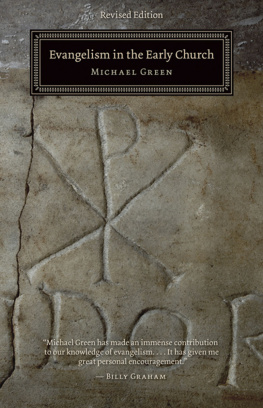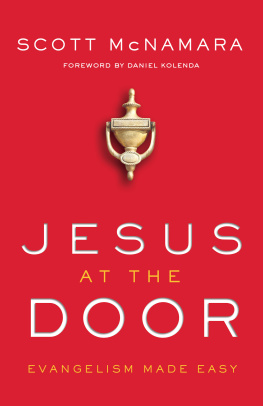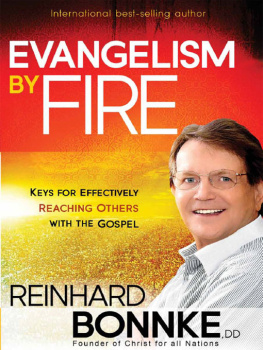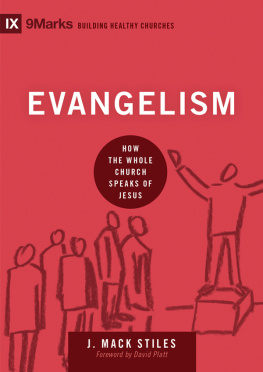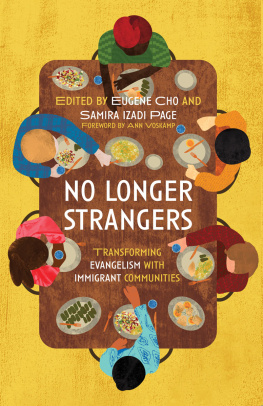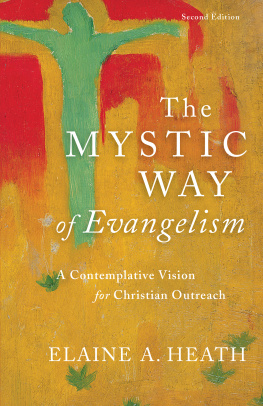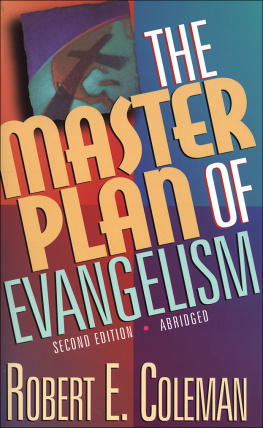

To my daughter, Damaris
I pray that the words of this book
will become reality in your life,
and may the words of The Book
continually be the word of our God
to your heart and life.
W. Oscar Thompson, Jr.
I NTRODUCTION
BY CLAUDE V. KING
QUESTIONS ABOUT OUR EVANGELISTIC PROGRAM
Prior to attending seminary in New Orleans, I served on the staff of a dynamic and evangelistic church in Nashville, Tennessee. I was trained in an evangelistic method that normally took teams to share the gospel with total strangers. We, however, were prepared to break the ice and establish some sort of relationship prior to talking about the person's spiritual needs. I am very grateful for that training experience because I studied the Scriptures and came to better understand what faith in Christ means. I learned how to use God's Word to tell others about his conditions for their salvation.
After going through the training course several times, I wound up leading the course for a while. From that perspective I made some new discoveries. Though we did see a number of people pray to receive Christ in their homes, very few ever followed through with a public commitment to Christ. We were not very effective at helping these people get established in a local body of Christ where they could grow.
We did see many adults make public professions of their faith in Christ. However, most of these did not come directly from our evangelistic visitation program. I noticed that most of these people were family, relatives, neighbors, or friends of our members. People who had learned to share the gospel with others were being used by God to lead people in their circles of influence to Christ. These were the people we were able to effectively assimilate into the church.
We didn't really plan for this type of outreach. It happened only as God's people were led to share the gospel with the people they were closest to. Our planned evangelism strategy served primarily to prepare and equip people for sharing Christ. God took them from that point and used them in sharing through their relationships. When I realized the reality of what was happening, I felt uneasy about the fact that our greatest evangelist fruit came not from our evangelistic program but through unplanned experiences of our members.
CONCENTRIC CIRCLES OF CONCERN
While I was attending seminary in the early 1980s, I came across Concentric Circles of Concern at the bookstore. As I began to read the experiences of Oscar and Carolyn Thompson, I kept thinking, This is it! Concentric Circles explained what God was doing through relationships in my previous church. I began to wonder why this book was not required reading for every seminary student. For me, it explained in moving ways how I could guide God's people to share Christ in a very natural way with the people they knew and loved. I saw how I could help people be used by God to show his love and see loved ones drawn to Jesus.
When I began to develop and write curriculum resources for lay discipleship, I came across two types of books. One could be very inspiring and informational but did not motivate me to change. It was like preaching an evangelistic message and then never giving an invitation for response.
The other type motivated me to apply what I was learning. Then in a small group context, other Christians could help me follow through in the application in ways that thoroughly changed my life. As I watched what God did through courses like Experiencing God, Fresh Encounter, and The Mind of Christ, I developed a conviction that book writers should regularly give an invitation for a reader to respond and apply the truths being taught.
For many years I've wanted to revise Concentric Circles of Concern to do just that. The message has so impacted my own life that I sensed God would use it in even greater ways as Christians helped each other apply the message to their own lives and ministries. This is what we pray will happen as you study this revised edition of Concentric Circles of Concern.
SEVEN STAGES FOR MAKING DISCIPLES
After studying Oscar's original message, I identified seven stages that he guided students to work through in reaching their world with the gospel. To help you see those stages more clearly, I've added those seven stages to the original Concentric Circles diagram. Now I invite you to walk through those stages in your own relationships. Oscar will teach you, with the help of the Holy Spirit, to develop the kind of lifestyle through which God can show his love to those around you.
PERSONALIZING THE CHAPTERS
At the end of each chapter, I've added some questions and activities to help you make personal application of the truths in your life and relationships. These activities will guide you to do what Oscar has taught.
One of my favorite Scriptures related to this process is Proverbs 16:3. Commit thy works unto the Lord, and thy thoughts shall be established (KJV). In other words, do the right things and you will experience God working through you in such a way that you will change your mind and attitudes as well. We usually take the opposite approach. We try to change our thinking before reforming our actions. God can work both ways, but sometimes obedience and doing are the best ways to get your thinking in line with God's ways. As you begin personalizing these truths by completing the activities, you will experience God working through your relationships to touch others for Christ. When you experience God in that way, your thinking and attitudes and actions will move in line with what God is doing.
SMALL-GROUP STUDY HELPS
Another addition to this revised work is the small-group activities section at the end of each chapter. I've titled these activities Building Up the Body.
God created us for relationships. When we come to Christ, he places us in the body of Christ because we need each other. We can and should stimulate one another to love and good deeds (Heb. 10:24). I highly recommend that you not read and study this book alone. Get a small group of other Christians to go through the study with you. By sharing and praying together, you will find that God will teach you things you would never learn alone. You will experience God working through your group to see others come to Christ.
You can study Concentric Circles of Concern at your own pace. If you use it as a supplement for an ongoing group like a Sunday School class, you may want to read and process one chapter each week. During your weekly class time, you can spend a few minutes sharing experiences and praying for each other. If you use the book as a specific training tool for lifestyle evangelism, you may want to study three or four chapters at a time. In this case, you would combine the small-group learning activities for each of the chapters covered by your group session.
THE FRINGE BENEFIT OF KOINONIA
I believe you will also experience one fringe benefit from studying this book with others. As you share and pray with each other about your relationships, you will develop a close fellowship with your fellow Christians. This is the koinonia (close love and fellowship) that God has intended for his people all along. Somehow, we have lost that experience in the busy lifestyles of modern life. God wants to restore that experience of love and fellowship to his people in our day. I pray you will experience the fullest dimensions of the love of Christ, together with all the saints (Eph. 3:1819).
Next page

